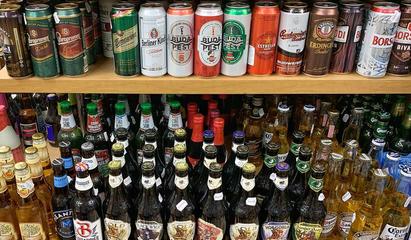
Recently, it was reported that the United States, one of the largest export markets for European alcoholic beverages, imports European alcoholic products worth up to 9 billion euros annually, which is approximately 10.43 billion US dollars. However, surprisingly, according to the latest trade agreement reached between the United States and Europe, alcoholic beverages were not included. Meanwhile, due to the impact of the steel and aluminum tariff policy, canned beer imported from other countries is expected to face a situation of price increase. According to data from the American Beer Association, as much as 64.1% of beer in the US market is sold in cans. What business logic and market changes are hidden behind this series of data and information? This article will conduct an in-depth analysis and discussion on this from the perspective of commercial commodities.
First of all, what we pay attention to is the current situation of the wine trade between the United States and Europe. The huge sales of European alcoholic beverages in the US market undoubtedly demonstrate the popularity of European alcoholic products among American consumers. However, the decision to exclude alcohol from the new trade agreement undoubtedly casts a shadow over this prosperous trade scene. What exactly is the reason behind this decision? Is it out of consideration for protecting the domestic alcohol industry, or is there a deeper game between the two sides in the alcohol trade? No matter what the reasons are, this decision will undoubtedly have a profound impact on the alcohol markets of both the United States and Europe.
For the United States, the reduction in the import of European alcoholic beverages may lead to a tight market supply, which in turn will push up the prices of alcoholic beverages. This is undoubtedly bad news for American consumers. At the same time, for European wine exporters, losing the huge market of the United States will undoubtedly have a significant impact on their sales performance. Under such circumstances, it is worth our further attention whether both sides will seek other trade channels to alleviate the current predicament.
On the other hand, the implementation of the steel and aluminum tariff policy cannot be ignored in terms of its impact on the canned beer market. Canned beer, as the mainstream sales form in the US market, the increase in its price will undoubtedly have an impact on consumers' purchasing intention. This influence may further spread to the entire beer market and even have a profound impact on the alcohol consumption structure in the United States. Against this backdrop, how beer producers and sellers respond to this challenge and maintain their market competitiveness will be a question worth exploring.
At the same time, we also need to recognize that this series of market changes has provided opportunities for alcoholic products from other countries and regions to enter the US market. In the context of globalization, market competition is becoming increasingly fierce. Any change in the market may trigger new business opportunities. For alcohol producers who are interested in entering the US market, the current market environment undoubtedly offers an opportunity to re-examine and adjust their market strategies.
To sum up, the new changes in the wine trade between the United States and Europe, as well as the impact of the steel and aluminum tariff policies on the canned beer market, undoubtedly bring new challenges and opportunities to the US wine market. In this series of market changes, how all parties adjust their strategies, meet challenges and seize opportunities will be the focus of our continuous attention. At the same time, these changes also remind us that every decision in the business world may trigger a series of chain reactions, affecting every corner of the market. Therefore, we need to analyze and understand these market changes from a more comprehensive and in-depth perspective in order to better cope with future business challenges.

According to the foreign media The Verge, recently, Tesla CEO Elon Musk's goals in the field of fully autonomous driving (FSD) have once again fluctuated.
According to the foreign media The Verge, recently, Tesla C…
In early 2026, Greenland along the North Atlantic coast bec…
Recently, the century-old American high-end department stor…
Recently, the U.S. stock market has appeared turbulent amid…
Recently, the largest private equity firm in South Korea, M…
In early 2026, after the Trump administration detained Vene…